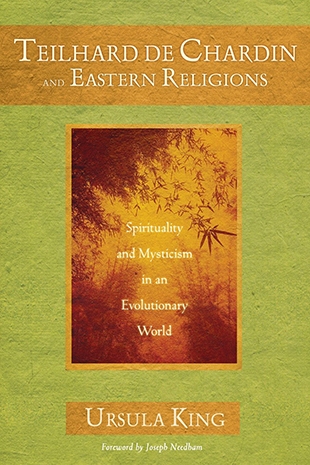Telhard de Chardin (1881-1955) was a Jesuit theologian and scientist who pioneered a holistic, earth-cherishing, and mystical theology. The French-born priest used his extensive training in geology and paleontology to pursue scientific projects in China and South Africa. However, his ambitious attempts to work out a theological synthesis of evolution and Christianity were rejected by Catholic authorities in Rome who forbade him to publish or lecture on religious matters during his lifetime.
Ursula King is an internationally known scholar on spirituality, interfaith dialogue, women and religion, and Teilhard de Chardin. She is professor emerita of theology and religious studies at the University of Bristol in England, where she chaired the religion department and directed the Centre for Comparative Studies in Religion and Gender, after teaching for many years at the University in Leeds, in London, and in India. She is the author of many books including Christian Mystics and Spirit of Fire.
This scholarly work is a revised edition of Ursula King’s 1980 work titled Toward a New Mysticism: Teilhard de Chardin and Eastern Religions. It has been out of print for 20 years. The author sees this extremely gifted Catholic priest as a pioneer covering many of the global themes which are so important today: the relevance of eastern religions and cultures, the urgency of ecological concerns, the confluence of science and religion after centuries of conflict, the need for a reinterpretation of Christianity, and a vision of planetary transformation. In his foreword, Joseph Needham salutes the daring work of Teilhard de Chardin and calls him "a prophet of this age."
In her introduction, Ursula King writes of her subject:
"He experienced the world with a great sense of wonder, as a gracious gift, beckoning him to discover, praise, and adore something, or rather Someone, greater than himself. This numinous experience has been the primary matrix of all poetic vision and philosophic insight, and of humanity's ongoing religious and scientific quest, which has always meant far more than just a search for knowledge. For Teilhard, the whole of the natural world and the cosmos, but also the human world, was a 'divine milieu,' suffused with divine presence and power."
King has divided the book into two sections. In the first, she focuses on the unity of Teilhard’s life and thought with analysis of his great vision of faith; his early contacts with the East and his penchant for mysticism; and his roles as a pilgrim, a scientist, and cross-cultural explorer.
In the second half of the paperback, King takes a hard look at Teilhard’s assessment of monism, pantheism, and mysticism. He was convinced that the East and the West converge to bring about new possibilities. He also was excited by an evolutionary blend of mysticism and activism. At one point in his self-examination, Teilhard said: "The greatest success I can hope for in my life — to have published a new vision of the world." He achieved that dream, and we are the lucky and grateful recipients of that legacy.
